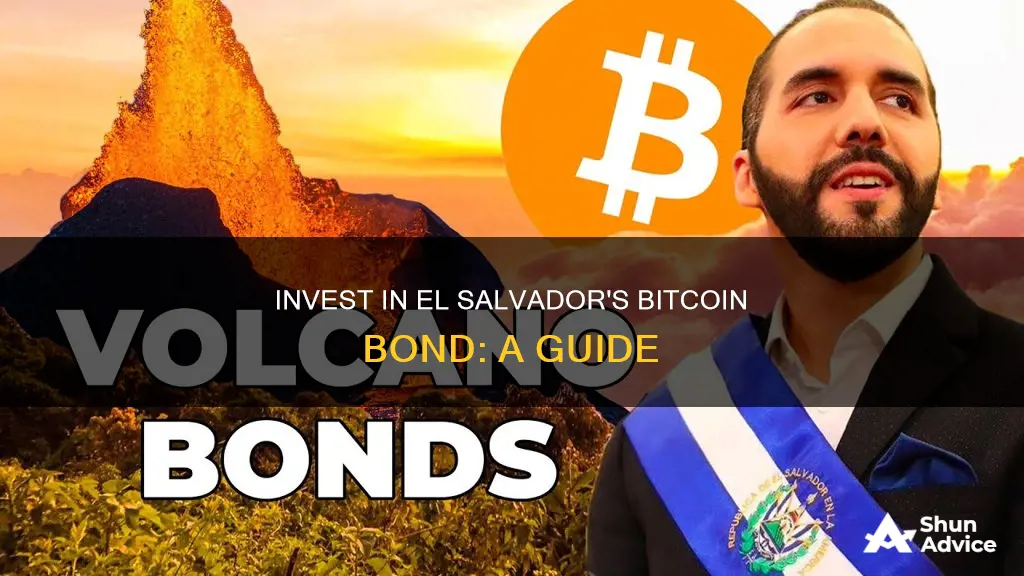
El Salvador has been making headlines in the world of finance and cryptocurrency with its plans to issue a Bitcoin Bond and build a Bitcoin City. In this paragraph, we will explore the country's ambitious initiatives and discuss the potential opportunities and risks for investors looking to get involved in this novel financial venture. With El Salvador's recent adoption of Bitcoin as legal tender and its plans to raise $1 billion through the issuance of the Bitcoin Bond, investors are presented with a unique opportunity to participate in the country's economic experiment. However, it is important to consider the potential risks associated with investing in a country facing a distressed-debt situation and the volatility of the cryptocurrency market.
| Characteristics | Values |
|---|---|
| Bond Name | Bitcoin Bond/Volcano Bond |
| Issuing Country | El Salvador |
| Bond Type | Bitcoin-backed bond |
| Bond Amount | $1 billion |
| Bond Maturity | 10 years |
| Bond Coupon Rate | 6.5% |
| Bond Issuance Date | Q1 2024 |
| Bond Issuance Platform | Bitfinex Securities Platform |
| Bond Use of Proceeds | 50% for creating Bitcoin City, 50% for boosting bitcoin mining activity |
| Bitcoin City Location | Near Conchagua Volcano |
| Bitcoin Mining Energy Source | Geothermal energy from a volcano |
What You'll Learn

The benefits of investing in El Salvador's Bitcoin bond
El Salvador's Bitcoin Bond, also known as the "Volcano Bond", presents a unique investment opportunity with several potential benefits. Here are some reasons why investing in this bond could be advantageous:
Support for Economic Development in El Salvador: The funds generated from the bond issuance will be used to support various economic development initiatives in El Salvador. Half of the proceeds will be allocated to the creation of "Bitcoin City", a special economic zone dedicated to Bitcoin enterprises, with tax advantages, friendly regulations, and incentives. The other half will be directed towards boosting Bitcoin mining activity in the country, including the development of sustainable mining practices using volcanic energy. These strategic investments have the potential to stimulate economic growth, create jobs, and attract further foreign investment.
Potential for High Returns: The Bitcoin Bond offers an attractive annual return of 6.5% over a ten-year period. Additionally, investors will benefit from an annual special dividend. According to Blockstream's projections, the annualized yield for investors could reach up to 146% by the 10th year, assuming a favourable performance of Bitcoin's price. This high yield potential makes the bond a compelling investment opportunity for those seeking substantial returns.
Addressing Sovereign Debt: El Salvador has been facing challenges with its sovereign debt, and the funds raised through the Bitcoin Bond are intended to contribute to addressing this issue. By investing in the bond, investors can play a role in supporting the country's efforts to manage its debt obligations and improve its financial stability.
Innovative Approach to Cryptocurrency Adoption: El Salvador has been a pioneer in adopting Bitcoin as legal tender, and the issuance of the Bitcoin Bond further solidifies its commitment to cryptocurrency. This innovative approach positions El Salvador as a leader in the exploration of new financial possibilities with Bitcoin and could attract attention and investment from the global crypto community.
Environmental and Social Responsibility: The "Volcano Bond" is backed by the proceeds generated from geothermal Bitcoin mining operations, harnessing the country's natural resources for sustainable energy practices. This unique feature ensures that the investment aligns with environmental, social, and governance (ESG) principles. El Salvador's commitment to leveraging renewable energy sources underscores its vision of becoming a global hub for responsible and sustainable cryptocurrency practices.
Overall, investing in El Salvador's Bitcoin Bond offers a combination of potential financial gains, support for economic development, and the opportunity to be part of a groundbreaking initiative in the world of cryptocurrency and sustainable energy.
Bitcoin: Risky Business or Safe Bet?
You may want to see also

The risks of investing in El Salvador's Bitcoin bond
El Salvador's Bitcoin Bond, also known as the Volcano Bond, is a risky investment for several reasons. Firstly, the bond is backed by Bitcoin, a highly volatile cryptocurrency. Bitcoin's value has fluctuated significantly, and it is unclear if it will stabilise or continue to experience extreme price swings. Investing in El Salvador's Bitcoin Bond is a big bet on the future value of Bitcoin.
Secondly, El Salvador's economic situation is distressed, with credit rating firms downgrading the country's credit rating to junk status. The country's outstanding government bonds are already considered high-risk, and the Bitcoin Bond may struggle to attract investors due to its lower interest rate compared to conventional dollar-denominated bonds. There are concerns about El Salvador's ability to manage its debt, and a default on existing bonds could impact the Volcano Bond.
Thirdly, the bond is linked to the construction of a "Bitcoin City", which is planned to be powered by geothermal energy from a nearby volcano. This project carries geological risks, and there are questions about the stability of building a city next to a volcano. The success of "Bitcoin City" is heavily dependent on the volatile price of Bitcoin, which could impact the bond's performance.
Additionally, there are environmental concerns associated with Bitcoin mining, which requires large amounts of energy. El Salvador plans to use geothermal energy from the volcano for mining, but the environmental impact of this process is unclear.
Furthermore, the legal rights of bond buyers are not yet clear. It is important for investors to understand their rights and the potential risks associated with purchasing the bond. The lack of transparency around the legal rights of buyers could deter potential investors.
Lastly, the adoption of Bitcoin as legal tender in El Salvador has been controversial, with international and domestic criticism. There are concerns about the lack of transparency, the use of tax dollars to purchase Bitcoin, and the limited internet penetration in the country, which could impact the usage and success of the cryptocurrency.
In conclusion, investing in El Salvador's Bitcoin Bond carries significant risks, including the volatility of Bitcoin, the country's distressed debt situation, the uncertainty of the "Bitcoin City" project, environmental concerns, unclear legal rights for buyers, and the controversial nature of Bitcoin's adoption as legal tender in El Salvador. Potential investors should carefully consider these risks before making any investment decisions.
The Ultimate Guide to Investing in Bitcoin
You may want to see also

How to invest in El Salvador's Bitcoin bond
El Salvador's Bitcoin Bond, also known as the "Volcano Bond", is a unique investment opportunity that combines the country's adoption of Bitcoin as legal tender and its plan to build a "Bitcoin City". Here's a step-by-step guide on how to invest in El Salvador's Bitcoin Bond:
Step 1: Understanding the Bond
El Salvador's Bitcoin Bond is a $1 billion bitcoin-backed bond announced by President Nayib Bukele in 2021. The bond has a 10-year maturity and is issued on the Liquid Network. The funds raised through the bond will be used for two main purposes: half of the money will go towards purchasing Bitcoin, while the other half will be invested in developing the "Bitcoin City" near a volcano.
Step 2: Evaluating the Risks and Potential
Investing in El Salvador's Bitcoin Bond comes with both risks and potential gains. On the one hand, the bond is backed by a country with a distressed-debt situation, and credit rating firms have cast El Salvador's bitcoin foray as a negative. Additionally, the bond appears to pay interest at a lower rate than the country's conventional dollar-denominated bonds. However, the potential upside is significant. The bond will offer a 6.5% coupon or annual interest payment. Investors will also receive dividends generated by staggered liquidation of bitcoin holdings from the sixth year, with an annualized yield potentially reaching 146% in the tenth year, according to Blockstream projections.
Step 3: Registration and Purchase
To invest in the El Salvador Bitcoin Bond, individuals must register on the Bitfinex Securities Platform, a subsidiary of Bitfinex, the global business partnering with the Salvadoran government on this program. The bond is expected to be issued during the first quarter of 2024, and more details about the acquisition and coupon processes are yet to be published.
Step 4: Staying Informed
As with any investment, it is essential to stay informed about the latest developments and news related to El Salvador's Bitcoin Bond. This includes following official announcements from the Salvadoran government, financial news outlets, and reputable sources within the cryptocurrency community.
Step 5: Understanding the Broader Context
El Salvador's Bitcoin Bond is part of the country's broader strategy to embrace Bitcoin and blockchain technology. In 2021, El Salvador became the first country to adopt Bitcoin as legal tender, and the government has actively promoted the use of Bitcoin wallets and transactions. This broader context of Bitcoin adoption in El Salvador may impact the success and perception of the Bitcoin Bond.
In conclusion, investing in El Salvador's Bitcoin Bond involves a careful consideration of the risks and potential gains associated with the country's economic situation and the broader adoption of Bitcoin. By following the steps outlined above, individuals can make informed decisions about investing in this unique and innovative financial instrument.
Bitcoin Investment: Is the Crypto Bandwagon Still Accessible?
You may want to see also

The impact of El Salvador's Bitcoin bond on the country's economy
El Salvador's Bitcoin bond, also known as the "Volcano Bond," has had a complex impact on the country's economy, with a mix of positive and negative effects.
On the one hand, the bond has helped El Salvador raise significant capital, with plans to issue about $1 billion worth of bonds. Half of this sum is intended to be converted into bitcoin, while the other half will be directed towards infrastructure development and bitcoin mining. The bond is expected to have a 10-year maturity and a coupon rate of 6.5%, which is significantly lower than the interest rate on the country's existing 10-year bonds. This makes the Bitcoin bond a more attractive investment option and could potentially lower the country's borrowing costs.
Additionally, the issuance of the bond has been accompanied by plans to construct a "Bitcoin City" near the Conchagua volcano, powered by geothermal energy. This city is envisioned to have residential and commercial areas, services, entertainment, restaurants, and even an airport. The construction of this city could boost the economy by attracting foreign investment and promoting tourism.
However, there have also been concerns and negative consequences associated with El Salvador's Bitcoin bond. The country's decision to adopt bitcoin as legal tender has been criticized due to the volatility of bitcoin, its environmental impact, and a lack of transparency in the government's fiscal policies. There have been protests by citizens who are concerned about the lack of transparency and the use of tax dollars to purchase bitcoin. Additionally, the limited internet penetration in the country could hinder the widespread use of cryptocurrency.
The use of bitcoin has also made it more difficult for Salvadorans to send and receive remittances, contrary to the initial expectations. The fees associated with bitcoin transactions are reported to be several times higher than traditional remittance methods. Furthermore, the value of bitcoin is highly volatile, and the country's bitcoin investments have lost value at times, impacting the country's reserves.
In conclusion, while El Salvador's Bitcoin bond has opened up new opportunities for economic growth and investment, it has also introduced risks and challenges. The full impact of these bonds on the country's economy remains to be seen, and it is a highly debated topic among experts and analysts.
Webull's Guide to Bitcoin Investment
You may want to see also

The role of Blockstream and Bitfinex in the issuance of the bond
Blockstream and Bitfinex played a crucial role in the issuance of El Salvador's Bitcoin Bond. Blockstream, a global leader in Bitcoin and blockchain infrastructure, was the architect and designer of the bond. The company proposed the idea of the "Bitcoin Bond" to the El Salvador government and worked closely with them to develop and model the bond structure. Blockstream's Chief Strategy Officer, Samson Mow, and Vice President of Financial Products, Jesse Knutson, led the effort in collaboration with the El Salvador government. The bond will be issued using Liquid, a bitcoin-based service created by Blockstream, providing a stable foundation for the tokenized bonds. Blockstream's Asset Management Platform (AMP) will facilitate annual payouts of coupons and dividends to investors.
Bitfinex, a crypto exchange, will be involved in issuing, selling, and servicing the bond alongside El Salvador's central bank. Bitfinex Securities will process and list the bond issuance, and there are plans to grant the company a license to operate within El Salvador's regulatory framework. This collaboration between El Salvador and Bitfinex has raised concerns among regulators and authorities outside the country due to Bitfinex's history of weak anti-money laundering controls and regulatory oversight.
Bitcoin's Meteoric Rise: Unlocking Life-Changing Wealth
You may want to see also
Frequently asked questions
The El Salvador Bitcoin Bond is a $1 billion bitcoin-backed bond that the country plans to use to raise funds for the construction of a "Bitcoin City" and for investments in Bitcoin itself.
The El Salvador Bitcoin Bond was initially scheduled to be issued in early 2022 but was postponed several times due to various factors, including crypto price fluctuations and the nation's financial situation. As of December 2023, the bond has received regulatory approval and is expected to be issued in the first quarter of 2024.
Investing in the El Salvador Bitcoin Bond carries risks due to the country's distressed-debt situation and the volatility of Bitcoin. Credit-rating firms have cast El Salvador's adoption of Bitcoin as legal tender as a negative, and there are concerns about weak governance and the potential impact on the country's economic stability. Additionally, the bond may struggle to attract investors due to the lower interest rate compared to the country's conventional dollar-denominated bonds.
The El Salvador Bitcoin Bond offers a unique opportunity to invest in a Bitcoin-backed financial instrument with a high projected yield. The bond is expected to offer a 6.5% coupon rate, and investors will also receive dividends generated by staggered liquidation of Bitcoin holdings from the sixth year. The annualized yield could reach up to 146% in the 10th year, according to Blockstream projections. Additionally, the bond may help El Salvador avoid defaulting on its debt and could lead to a greater acceptance of Bitcoin by other countries and central banks.







